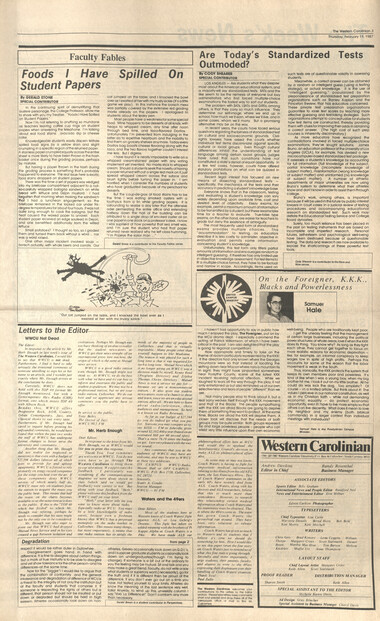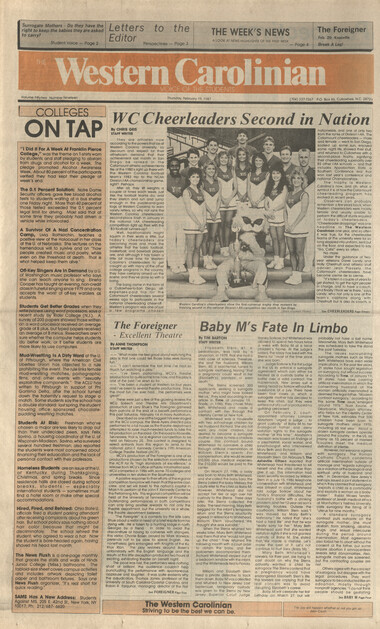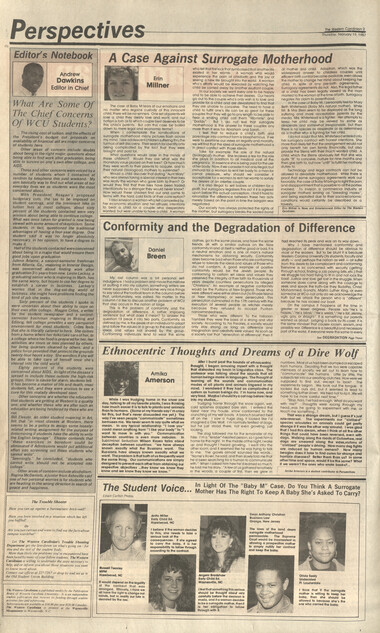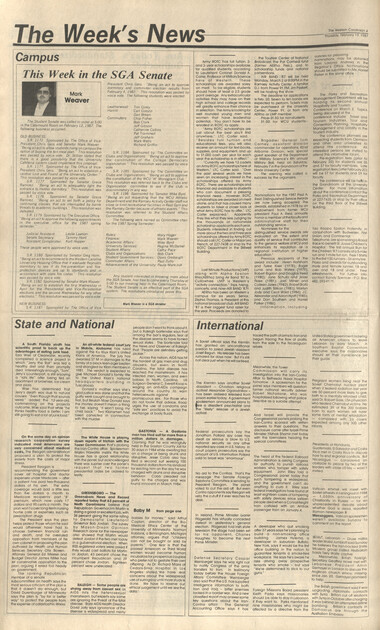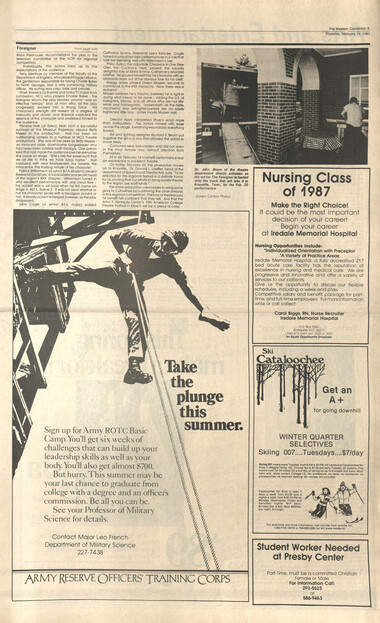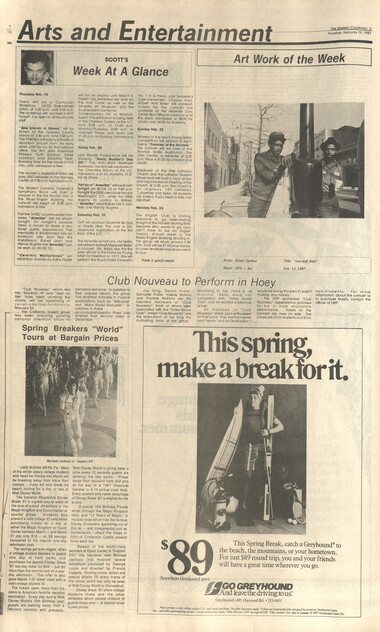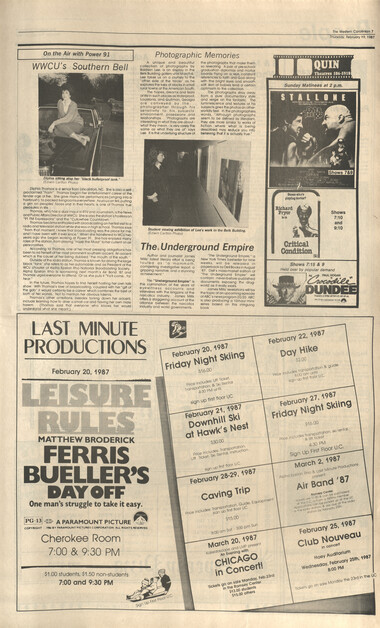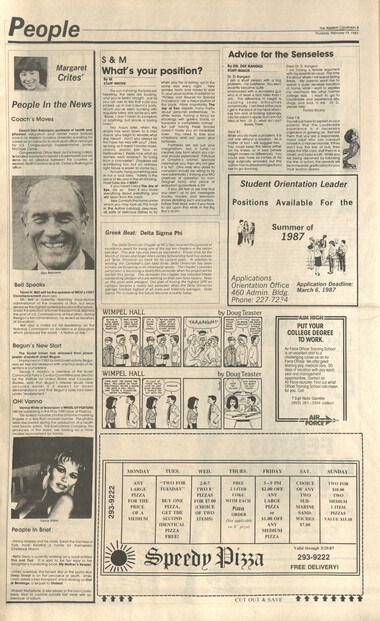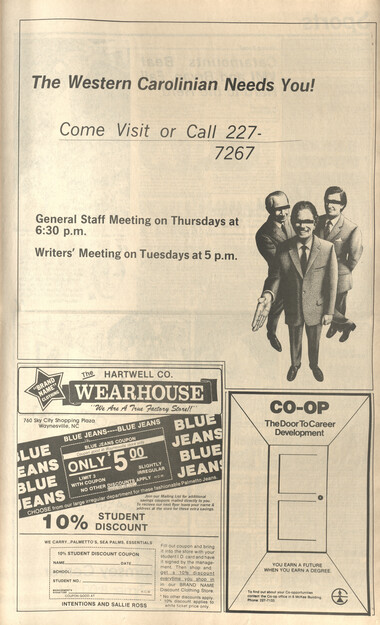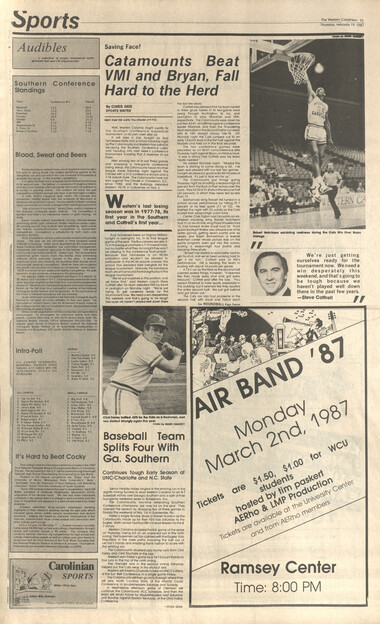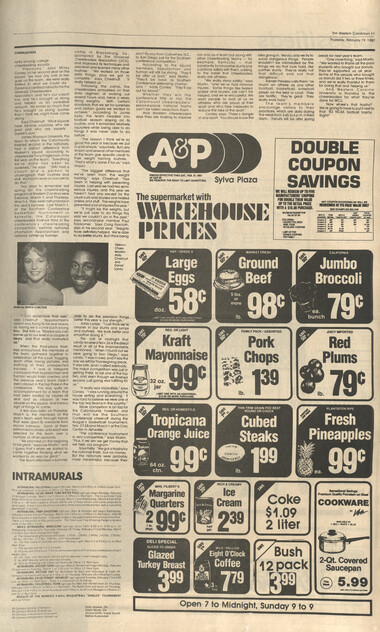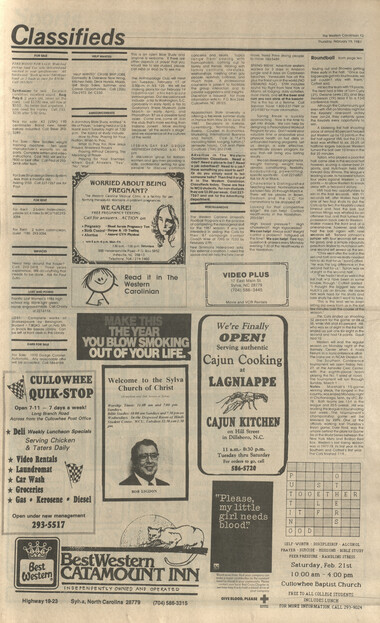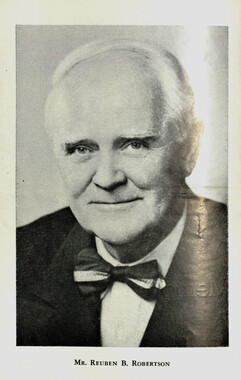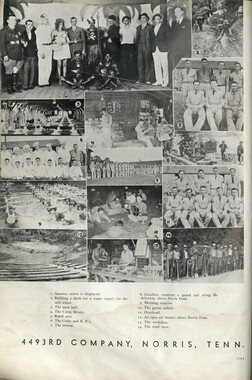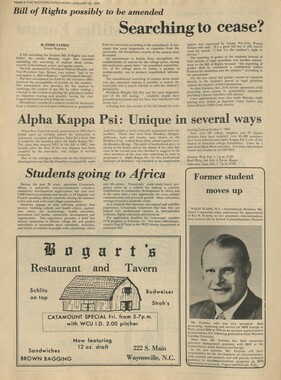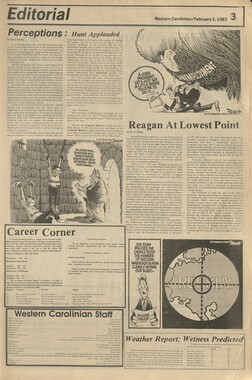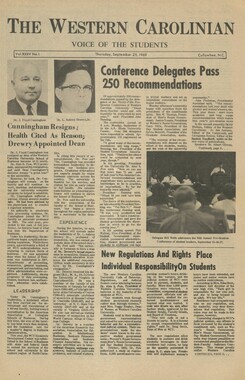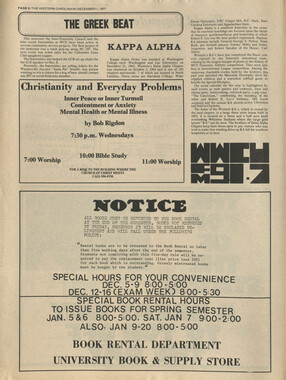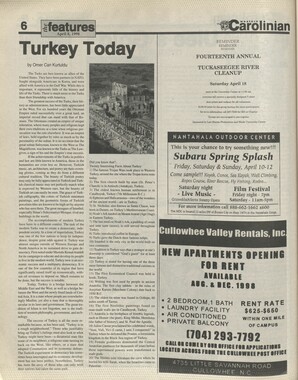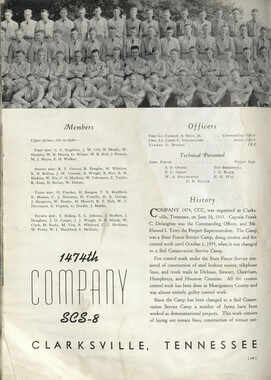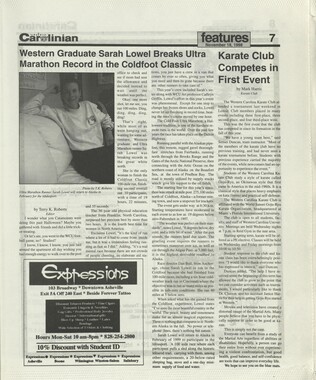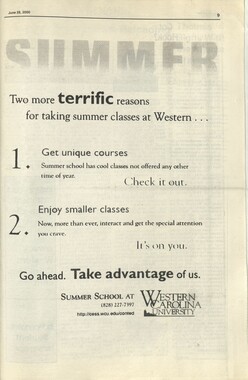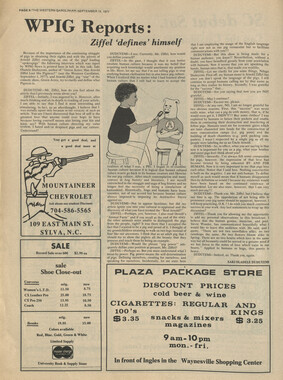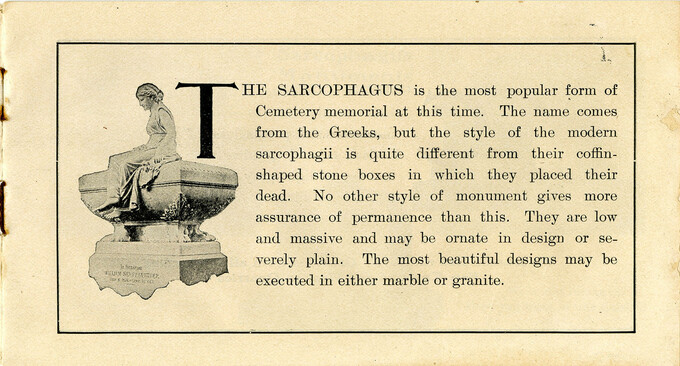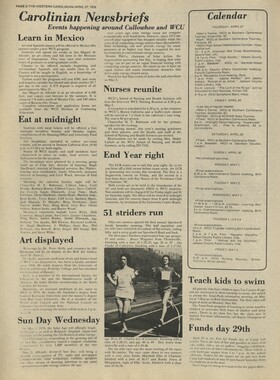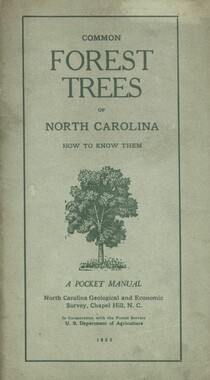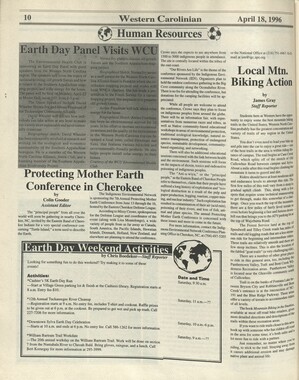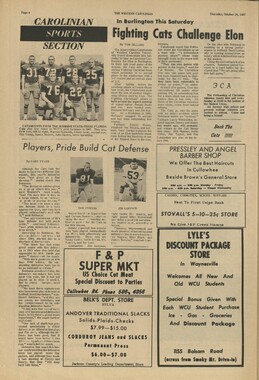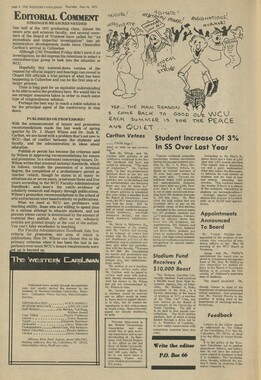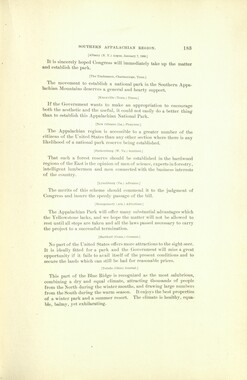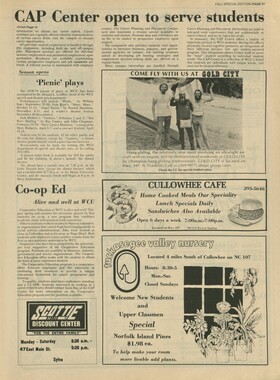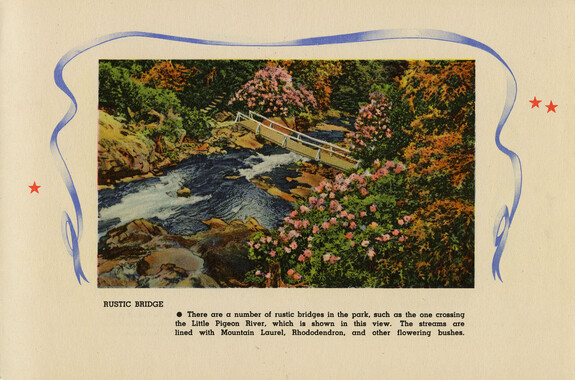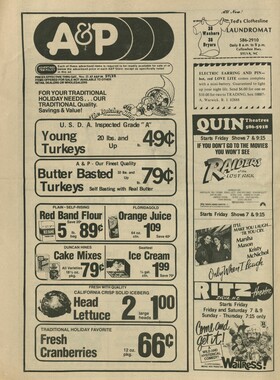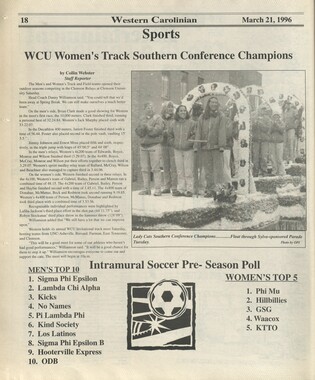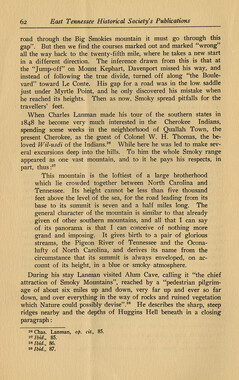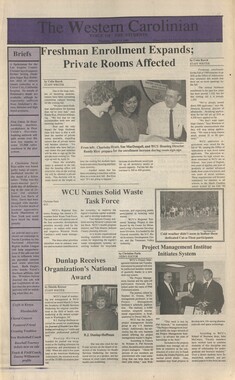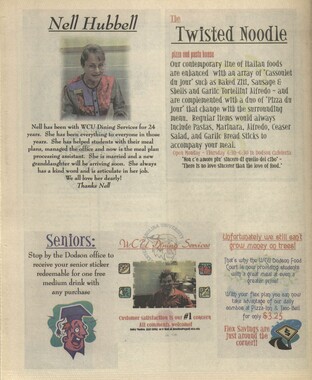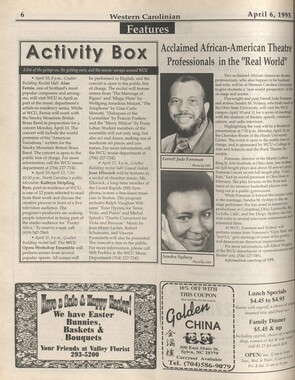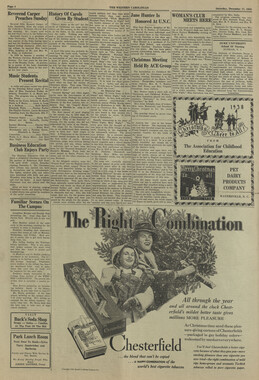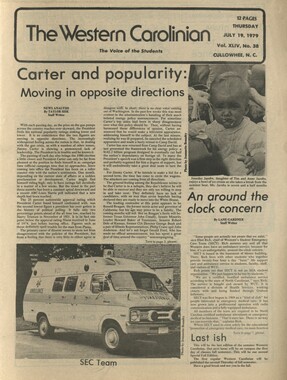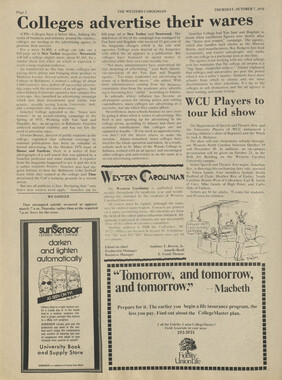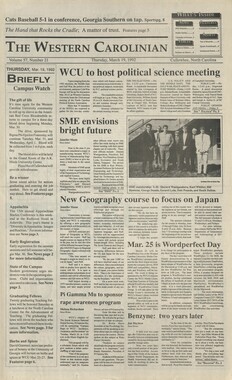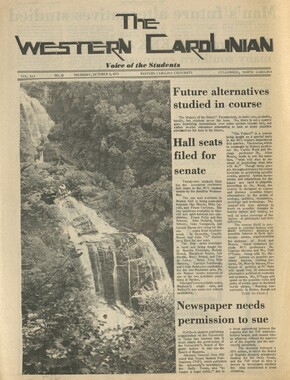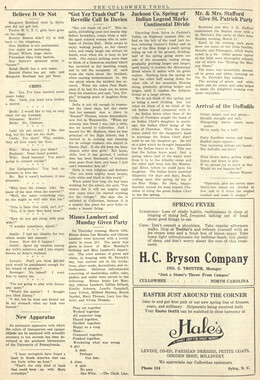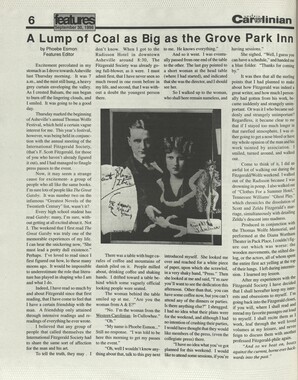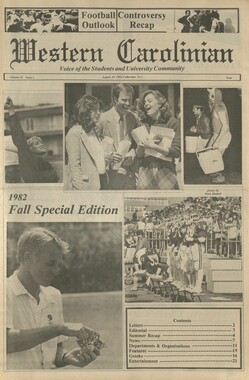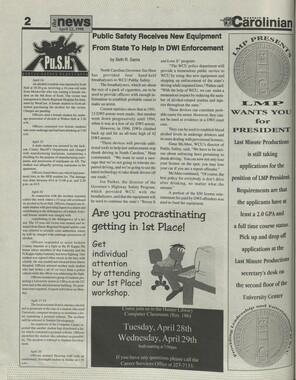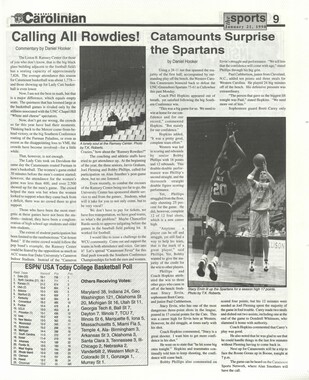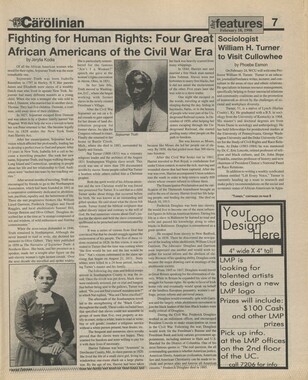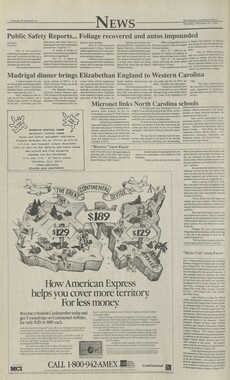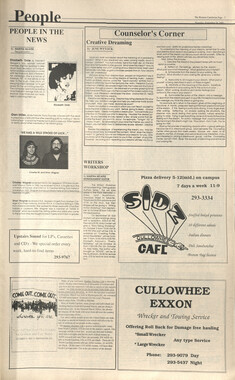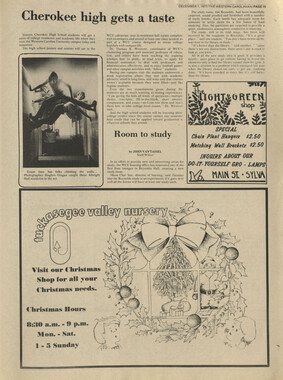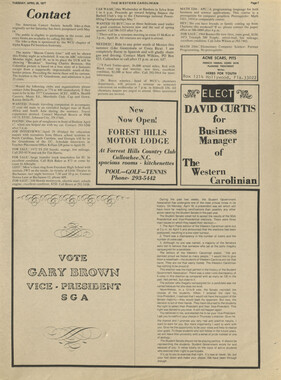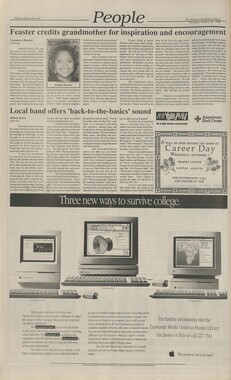Western Carolina University (20)
View all
- Canton Champion Fibre Company (2308)
- Cherokee Traditions (293)
- Civil War in Southern Appalachia (165)
- Craft Revival (1942)
- Great Smoky Mountains - A Park for America (2767)
- Highlights from Western Carolina University (430)
- Horace Kephart (941)
- Journeys Through Jackson (154)
- LGBTQIA+ Archive of Jackson County (26)
- Oral Histories of Western North Carolina (314)
- Picturing Appalachia (6772)
- Stories of Mountain Folk (413)
- Travel Western North Carolina (160)
- Western Carolina University Fine Art Museum Vitreograph Collection (129)
- Western Carolina University Herbarium (92)
- Western Carolina University: Making Memories (708)
- Western Carolina University Publications (2283)
- Western Carolina University Restricted Electronic Theses and Dissertations (146)
- Western North Carolina Regional Maps (71)
- World War II in Southern Appalachia (131)
University of North Carolina Asheville (6)
View all
- Allanstand Cottage Industries (62)
- Appalachian National Park Association (53)
- Bennett, Kelly, 1890-1974 (1388)
- Berry, Walter (76)
- Brasstown Carvers (40)
- Carver, George Washington, 1864?-1943 (26)
- Cathey, Joseph, 1803-1874 (1)
- Champion Fibre Company (233)
- Champion Paper and Fibre Company (297)
- Cherokee Indian Fair Association (16)
- Cherokee Language Program (22)
- Crowe, Amanda (40)
- Edmonston, Thomas Benton, 1842-1907 (7)
- Ensley, A. L. (Abraham Lincoln), 1865-1948 (275)
- Fromer, Irving Rhodes, 1913-1994 (70)
- George Butz (BFS 1907) (46)
- Goodrich, Frances Louisa (120)
- Grant, George Alexander, 1891-1964 (96)
- Heard, Marian Gladys (60)
- Kephart, Calvin, 1883-1969 (15)
- Kephart, Horace, 1862-1931 (313)
- Kephart, Laura, 1862-1954 (39)
- Laney, Gideon Thomas, 1889-1976 (439)
- Masa, George, 1881-1933 (61)
- McElhinney, William Julian, 1896-1953 (44)
- Niggli, Josephina, 1910-1983 (10)
- North Carolina Park Commission (105)
- Osborne, Kezia Stradley (9)
- Owens, Samuel Robert, 1918-1995 (11)
- Penland Weavers and Potters (36)
- Roberts, Vivienne (15)
- Roth, Albert, 1890-1974 (142)
- Schenck, Carl Alwin, 1868-1955 (1)
- Sherrill's Photography Studio (2565)
- Southern Highland Handicraft Guild (127)
- Southern Highlanders, Inc. (71)
- Stalcup, Jesse Bryson (46)
- Stearns, I. K. (213)
- Thompson, James Edward, 1880-1976 (226)
- United States. Indian Arts and Crafts Board (130)
- USFS (683)
- Vance, Zebulon Baird, 1830-1894 (1)
- Weaver, Zebulon, 1872-1948 (58)
- Western Carolina College (230)
- Western Carolina Teachers College (282)
- Western Carolina University (1794)
- Western Carolina University. Mountain Heritage Center (18)
- Whitman, Walt, 1819-1892 (10)
- Wilburn, Hiram Coleman, 1880-1967 (73)
- Williams, Isadora (3)
- Cain, Doreyl Ammons (0)
- Crittenden, Lorraine (0)
- Rhodes, Judy (0)
- Smith, Edward Clark (0)
- Appalachian Region, Southern (2399)
- Asheville (N.C.) (1917)
- Avery County (N.C.) (26)
- Blount County (Tenn.) (161)
- Buncombe County (N.C.) (1671)
- Cherokee County (N.C.) (283)
- Clay County (N.C.) (555)
- Graham County (N.C.) (233)
- Great Smoky Mountains National Park (N.C. and Tenn.) (510)
- Haywood County (N.C.) (3522)
- Henderson County (N.C.) (70)
- Jackson County (N.C.) (4692)
- Knox County (Tenn.) (25)
- Knoxville (Tenn.) (12)
- Lake Santeetlah (N.C.) (10)
- Macon County (N.C.) (420)
- Madison County (N.C.) (211)
- McDowell County (N.C.) (39)
- Mitchell County (N.C.) (132)
- Polk County (N.C.) (35)
- Qualla Boundary (981)
- Rutherford County (N.C.) (76)
- Swain County (N.C.) (2113)
- Transylvania County (N.C.) (247)
- Watauga County (N.C.) (12)
- Waynesville (N.C.) (73)
- Yancey County (N.C.) (72)
- Aerial Photographs (3)
- Aerial Views (60)
- Albums (books) (4)
- Articles (1)
- Artifacts (object Genre) (228)
- Bibliographies (1)
- Biography (general Genre) (2)
- Cards (information Artifacts) (38)
- Clippings (information Artifacts) (191)
- Crafts (art Genres) (622)
- Depictions (visual Works) (21)
- Design Drawings (1)
- Drawings (visual Works) (184)
- Envelopes (73)
- Facsimiles (reproductions) (1)
- Fiction (general Genre) (4)
- Financial Records (12)
- Fliers (printed Matter) (67)
- Glass Plate Negatives (381)
- Guidebooks (2)
- Internegatives (10)
- Interviews (812)
- Land Surveys (102)
- Letters (correspondence) (1013)
- Manuscripts (documents) (619)
- Maps (documents) (177)
- Memorandums (25)
- Minutes (administrative Records) (59)
- Negatives (photographs) (5835)
- Newsletters (1285)
- Newspapers (2)
- Occupation Currency (1)
- Paintings (visual Works) (1)
- Pen And Ink Drawings (1)
- Periodicals (193)
- Personal Narratives (10)
- Photographs (12976)
- Plans (maps) (1)
- Poetry (7)
- Portraits (1960)
- Postcards (329)
- Programs (documents) (151)
- Publications (documents) (2237)
- Questionnaires (65)
- Scrapbooks (282)
- Sheet Music (2)
- Slides (photographs) (402)
- Songs (musical Compositions) (2)
- Sound Recordings (796)
- Specimens (92)
- Speeches (documents) (15)
- Tintypes (photographs) (8)
- Transcripts (322)
- Video Recordings (physical Artifacts) (23)
- Vitreographs (129)
- Text Messages (0)
- A.L. Ensley Collection (275)
- Appalachian Industrial School Records (7)
- Appalachian National Park Association Records (336)
- Axley-Meroney Collection (2)
- Bayard Wootten Photograph Collection (20)
- Bethel Rural Community Organization Collection (7)
- Blumer Collection (5)
- C.W. Slagle Collection (20)
- Canton Area Historical Museum (2110)
- Carlos C. Campbell Collection (282)
- Cataloochee History Project (65)
- Cherokee Studies Collection (4)
- Daisy Dame Photograph Album (5)
- Daniel Boone VI Collection (1)
- Doris Ulmann Photograph Collection (112)
- Elizabeth H. Lasley Collection (1)
- Elizabeth Woolworth Szold Fleharty Collection (4)
- Frank Fry Collection (95)
- George Masa Collection (173)
- Gideon Laney Collection (452)
- Hazel Scarborough Collection (2)
- Hiram C. Wilburn Papers (28)
- Historic Photographs Collection (236)
- Horace Kephart Collection (861)
- Humbard Collection (33)
- Hunter and Weaver Families Collection (1)
- I. D. Blumenthal Collection (4)
- Isadora Williams Collection (4)
- Jesse Bryson Stalcup Collection (47)
- Jim Thompson Collection (224)
- John B. Battle Collection (7)
- John C. Campbell Folk School Records (80)
- John Parris Collection (6)
- Judaculla Rock project (2)
- Kelly Bennett Collection (1407)
- Love Family Papers (11)
- Major Wiley Parris Civil War Letters (3)
- Map Collection (12)
- McFee-Misemer Civil War Letters (34)
- Mountain Heritage Center Collection (4)
- Norburn - Robertson - Thomson Families Collection (44)
- Pauline Hood Collection (7)
- Pre-Guild Collection (2)
- Qualla Arts and Crafts Mutual Collection (12)
- R.A. Romanes Collection (681)
- Rosser H. Taylor Collection (1)
- Samuel Robert Owens Collection (94)
- Sara Madison Collection (144)
- Sherrill Studio Photo Collection (2558)
- Smoky Mountains Hiking Club Collection (616)
- Stories of Mountain Folk - Radio Programs (374)
- The Reporter, Western Carolina University (510)
- Venoy and Elizabeth Reed Collection (16)
- WCU Gender and Sexuality Oral History Project (32)
- WCU Mountain Heritage Center Oral Histories (25)
- WCU Oral History Collection - Mountain People, Mountain Lives (71)
- WCU Students Newspapers Collection (1744)
- Western North Carolina Tomorrow Black Oral History Project (69)
- William Williams Stringfield Collection (2)
- Zebulon Weaver Collection (109)
- African Americans (390)
- Appalachian Trail (35)
- Artisans (521)
- Cherokee art (84)
- Cherokee artists -- North Carolina (10)
- Cherokee language (21)
- Cherokee pottery (101)
- Cherokee women (208)
- Church buildings (167)
- Civilian Conservation Corps (U.S.) (110)
- College student newspapers and periodicals (1830)
- Dams (103)
- Dance (1023)
- Education (222)
- Floods (61)
- Folk music (1015)
- Forced removal, 1813-1903 (2)
- Forest conservation (220)
- Forests and forestry (921)
- Gender nonconformity (4)
- Great Smoky Mountains National Park (N.C. and Tenn.) (181)
- Hunting (38)
- Landscape photography (10)
- Logging (103)
- Maps (84)
- Mines and mineral resources (8)
- North Carolina -- Maps (18)
- Paper industry (38)
- Postcards (255)
- Pottery (135)
- Railroad trains (71)
- Rural electrification -- North Carolina, Western (3)
- School integration -- Southern States (2)
- Segregation -- North Carolina, Western (5)
- Slavery (5)
- Sports (452)
- Storytelling (245)
- Waterfalls -- Great Smoky Mountains (N.C. and Tenn.) (66)
- Weaving -- Appalachian Region, Southern (280)
- Wood-carving -- Appalachian Region, Southern (328)
- World War, 1939-1945 (173)
Western Carolinian Volume 52 Number 19
Item
Item’s are ‘child’ level descriptions to ‘parent’ objects, (e.g. one page of a whole book).
-
-
The Western Carolinian 3 Thursday, February 19, 1987- Foods I Have Spilled On Student Papers By GERALD STONE SPECIAL CONTRIBUTOR In the continuing spirit of demystifying that austere personage, the College Professor, allow me to share with you my Treatise: "Foods I Have Spilled on Student Papers." Now I'm not referring to anything so mundane as teachers leaving coffee cup rings on student papers when answering the telephone. I'm talking about real food stains: avocado dip or cheese cake. Knowledgeable students easily discern telltale spilled food signs by a yellow stain and slight crumpling in a specific region of the returned paper. A stainless pa per crumpled equally across theentire sheet is more likely to have been thrown in the trash basket once during the grading process, perhaps by mistake. But having a paper thrown in the trash during the grading process is something that's probably happened to everyone. The real issue here is exotic food stains dropped on student papers. There was the time a set of papers was wedged into my briefcase compartment adjacent to a not- so-carefully wrapped bologna sandwich on white bread with lettuce and Dejon mustard. I had forgotten that morning when making the sandwich that I had a luncheon engagement, so the briefcase remained in the locked car under 96- degree temperatures for about fourhours. It was not quite long enough to cook the bologna, but the heat caused the waxed paper to unravel. Each student paper received an edge sauteed in Dejon, and one benefitted additionally from the wilted lettuce. Small potatoes? I thought so too, so I graded them and turned them back without a word ... nor was a word raised. One other major incident involved soup — borsch actually, with whole beets and carrots. Our cat jumped on the table, and I knocked the bowl over as I swatted at her with my trusty sickle (it's a little game we play). In this instance the borsch mess was partially covered by the extensive red grading marks already on the papers. I apologized to students about the leaky pen. Most people have a weakness for some special food. Mine happens to be desserts of all kinds, with heaps fo whipped cream, any time after noon through bed time, and taco-flavored Doritos. Unfortunately I'm prevented from indulging in the latter do to repetitive heartburn and the inability to fina them on grocery shelves anymore. Today every Doritos bag boasts cheese flavoring along with the taco, and the two flavors together couldn't interest me less. But I digress. I have found it is nearly impossible to write on a whipped cream-stained paper with any writing implement yet invented. No marks stick to whipped cream. Should a students seek the novelty of having a paper returned without a single red mark on it, just spread whipped cream across the suface and brush lightly before turning the paper in. I am horrified when I consider the numbers of students who have graduated because of my penchant for desserts. But the coup-de-gras of food stains has to be the time I was eating smoked oysters with a toothpick from a tin while grading papers. It is astounding to realize a day later that the offensive oder permeating the entire office and extending halfway down the hall of the building can be attributed to a single drop of smoked oyster oil on one paper in one stack on a professor's desk. I know I was suprised at how powerful that sea smell was, and I'm sure the student who had that paper returned never realized why he left class humming, "I'm Popeye the sailor man ...." Gerald Stone is a contributor to the Faculty Fables series. T«v*.*wsW "Our cat jumped on the table, and I knocked the bowl over as I swatted at her with mv trusty sickle." Letters to the Editor- WWCU Not Dead The Editor: In response to the article by Mr. Herb Enough in last week's issue of The Western Carolinian, I would like to say that WWCU is not dead. Furthermore. I find it hard to take seriously the irrational comments of someone unwilling to sign his or her name to an article, and 1 wonder just exactly where Mr. Enough arrives at the conclusions he does. Currently. WWCU does not hold with the TOP 40 format Mr. Enough mentioned, but with a Contemporary Hits Radio (CHR) format, one which mixes TOP 40 with Album Rock. Besides this, WWCU offers Progressive Rock, A OR, Country, Urban Contemporary, Jazz, and Classical shows to suit every taste. Furthermore, if Mr. Enough had cared to inquire before printing his unfounded comments, he would have found that within the past two weeks the staff of WWCU has undergone format changes to better serve the university and community. Another thing that Mr. Enough did not realize (or neglected to mention) is that even with a budget of '27,594 dollars (almost all of which goes to provide for and upkeep equipment), W WCU is forced to rely primarily on stingy record companies for the songs you hear over the air. If these companies deny WWCU service, of which nearly half do, WWCU must rely on students from the station to acquire the music you the public hear. This means that half the music on the charts becomes available to us the same time as it does to the public. If this is the "TOP 40 which has fizzled" to which Mr. Enough was refermg, perhaps he needs to consider that his taste might not be the only one to be considered. Mr. Enough was also eager to point out that WWCU had dropped Mutual Mews Service and in his eyes created a gap between isolation and civilization. Perhaps Mr. Enough was too busy thinking of an alias to realize that the student newscasters at WWCU get their news straight off an international press wire machine, the origin of which is the same as Mutual news service. WWCU is a good radio station even though Mr. Enough might not think so. At WWCU, we do the best with what we have and try our best to inform and entertain the public and student population. We may not be a professional station, but we are your radio station, Cullowhee. We do our best and we appreciate any serious comments you the public have to offer. In service to the public, Tony Bailey The Doctor of Jazz WWCU 90.5 FM Mr. Herb Enough Dear Editor, In response to the letter from Mr. Herb Enough, we at WWCU would like you to print this response. Thank You. Your comments are welcome at WWCU. You do not even have to go through The Western Carolinian to bring them to our attention. We appreciate the feedback. I particularly was wondering if the communitcations diagrams we were alway shown in class (which said we would get feedback) were correct or not. Bui along with your feedback, "Herb," please welcome this feedback from the WWCU staff on your letter. "Herb," your letter tells me you want to know more about radio. Especially radio at WCU. You must be a little knowledgable of radio waves, because even a freshman knows that WWCU has a perpetual monopoly on the radio market in Cullowhee. This means many things, but most importantly, it means that one radio station has to satisfy the needs of the majority of people in Cullowhee, and that is virtually impossible. Many people other than yourself happen to like Madonna. The reason it was played for such a long time is that it was requested for such a long time. Mutual News which is no longer airing on WWCU was a decision made by myself, Kenny Reed (Program Director) and Zilphia Thomas (News Director). Mutual News is not a service we pay for — because we are a noncommercial station. It also gives our student newscasters more of a chance to shine and learn, since we are an educational station, after all. We are here to learn about radio I television, their audiences and management. So here is a lesson on Radio Revenues. As Jar as our budget of $27,594 go you do indeed get what you pay for. Stations you may compare us to, say KISS — FM in Ashevilie, gross around $2,102,400 a year (based on an estimated $60 per 60 second spot). That's a mere 76.19 times the budget we gel. lam very pleased with the way we sound. Any comments that you as the audience of WWCU may have are welcome, and may be sent to WWCU at these two addresses. ON CAMPUS: WWCU-Radio, Moore Hall or OFF CAMPUS: WWCU. P.O. Box 2728, Cullowhee, NC 28723. Sincerely, Stuart A. Condie Station Manager WWCU - 91 FM Waters and the 49ers Dear Editor, Most of the students here at Western know of Coach Waters'fight against ALS, or Lou Gehrig's Disease. This fight has taken on added meaning with the brothers of Pi Kappa Alpha as Coach Waters is a Pike. We have made ALS our Degradation from page 2 respect it would be rather duller in Dullowhee. Disagreement goes hand in hand with difference. It is fine to disagree about certain things, but a mark of true maturity is to be able to disagree and yet show tolerance for the other person-and his differences-at the same time. Now for the "biggie"! I would like to argue that the combination of conformity and the general intolerance and degradation of difference at WCU is a threat to the integrity of not only the institution but of the faculty and students that comprise it. If someone is respecting the rights of others but is different, that person should not be insulted or put down or degraded but should be held in high esteem. Athletes occasionally look aown on non- athletes, Greeks occasionally look down on G.D.I.'s, and I suppose graduate students occasionally look down on undergraduates(though I'm trying to change). If someone is a bit out of the ordinary to you the feeling may be mutual. Sit and talk and you may make a great friend. Faculty, do not write or say what students or superiors wa nt (necessarily), go for the truth and if it is different then be proud of the difference. If you don't ever go out on a limb you have not tested yourself to your limits. Athletes do know the meaning of the last sentence very well, folks! Anyway, to wind up this unwieldly column I say/Viva La Difference!" Don't comform any more than necessary. Are Today's Standardized Tests Outmoded? By CODY SHEARER SPECIAL CONTRIBUTOR LOS ANGELES — Ask students what they despise most about the American educational system, and a majority will say standardized tests. SATs and the like seem to be the nemesis of everyone but lazy administrators who find forced multiple-choice examinations the fastest way to sort out students. The problem with SATs, LSATs and GREs, among others, is that they carry so much influence. They determine our self-image, where we end up in school, how much we'll earn, where we'll live, and in some cases, whom we'll marry. But a promising alternative may be on the way. In recent years, the courts have faced serious questions regarding the fairness of standardized test on cultural and socio-economic grounds. Civil- rights lawyers have asked the courts whether individual test items discriminate against specific cultural or racial groups. Even though cultural differences inhibit the understanding of test language among certain racial groups, judges have ruled that such conditions have not constituted a state's denial of equal opportunity. In a few test cases, however, courts have offered statutory prohibitions on what can be quizzed in standardized tests. Recent legal interest has focused on new means of dissecting standardized tests — specifically, the mechanics of the tests and their accuracy in predicting a student's knowledge base. Everyone knows that in the classroom, testing and evaluating a student's knowledge can vary widely depending upon available time, cost and desired level of objectivity. Essay exams, for example, permit a maximum amount of information to be transmitted by a student, but these exams take time for a teacher to evaluate. True-false type exams, on the other hand, are easier for teachers to grade but deny the existence of ambiguity. The most frequently used form of standardized exams provides multiple choices. This "accommodation" to testing, as educators describe it is less costly to administer, objective in evaluation and permits some information concerning student's knowledge. Unfortunately, this test form only filters partial amounts of information and encourages random or intelligent guessing. It therefore has only limited use in objective knowledge assessment. For test items to fit a multiple-choice format, they have to be factual and narrow in scope. Accordingly, items used on such tests are of questionable validity in assessing students. Meanwhile, a correct answer can be obtained by a random or intelligent guess (using a testing strategy), or actual knowledge. It is the use of "intelligent guessing," popularized by the preponderance of standardized test preparation organizations such as Stanley Kaplan and the Princeton Review, that has educators concerned. These private test preparation organizations guarantee to raise test scores by teaching more effective guessing and test-taking strategies. Such organizations attempt to conceptualize for students how test items are constructed, thereby providing them with clues for improving their odds in obtaining a correct answer. (The high cost of such prep courses is inherently discriminatory.) As more educators have recognized the contradictions involved in forced multiple-choice examinations, they've sought solutions. James Bruno, an education professor at the University at Los Angeles (UCLA), for example, has devised a new microcomputer-based standardized test package. It assesses a students's knowledge by accounting for full information (full knowledge of the subject, partial knowledge (incomplete knowledge of subject matter), misinformation (wrong knowledge of subject matter) and uninformed (no knowledge of subject matter). A number of athletic departments at major universities are now using Bruno's system to determine what their athletes know and don't know in order to assist them through college. Bruno's work, among others, is important because it will be used in the future by public-interest lawyers in court cases in a judicial review of testing procedures and accompanying educational research on standardized test. Such work may deflate the Educational Testing Service and College Board dynasties. Surely, too much reliance has been placed in the past on testing instruments that are based on incomplete and imperfect research. Personal futures, self-esteem and psychological well-being have been destroyed because of questionable testing. The data and research are now available to expose the shortcomings of these powerful test tools. Cody Shearer is a contributor to the Here and Now series. On the Foreigner, K.K.K., Blacks and Poxverlessness I haven't had opportunity to say in public how much I enjoyed the play, The Foreigner, put on by the WCU drama dept. I especially commend the acting of Patrick Williamson, of which I have been critical in the past. I am also delighted that the play is going to regional competition! How appropriate and timely to take on the theme of racism particularly represented by the KKK! If the directors had only known where the Georgia mountains were so that instead of locating the setting down near Macon where nary a mountain tis in sight, they might have pinpointed somewhere near Forsythe County, scene of the latest KKK incident receiving national attention. While we laughed to tears all the way through the play, it not only entertained us but also reminded us of our own selectiveness and fears of people "different" than we are. Not many people stop to think about it, but a real irony weaves itself through the KKK movement and that of the Blacks. The people sympathizing with the KKK are afraid Blacks are going to deprive them of something they want to protect. Atthesame time, Blacks are afraid the KKK will deprive them. A closer look will disclose that the needs of both groups may be quite similar. Both groups represent by and large powerless people -- people who can wield very little influence upon their own economic Samuel Hale is the Presbyterian Campus Minister. well-being. People who are traditionally kept poor. I get the uneasy feeling that the management of certain large businesses, including the political power structures of whole areas, love it when the KKK does its thing. You know why? As long as they fight each other, they cannot get together to focus on more realistic reasons for economic deprivation - like, for example, an informal conspiracy to keep wages low in spite of high profits. Perhaps this accounts for some of the reason that the labor movement is weak in the South. Thus, ironically, the KKK protects the system that keeps its own members poor and powerless. It's kind of like when I was a young boy; when my big brother hit me, I took it out on my little brother. All he could do was kick the dog. Too simplistic? Of course - in a limited article. But think about it! The values I perceive in our national constitution, as well as in my Christian faith - while not demanding economic equality - do protect economic opportunity, even if I have to live more simply so that others can live decently. What does it mean to love my neighbor and my enemy (both biblical commands) in a larger context than individual meetings with individuals? Daniel Breen is a student contributor to Perspectives. philantrophical effort here at WCU and would like to applaud the Interfraternity Council's decision to make A LS its philantrophical effort also. As some may or may not know,. Coach Waters is having to fight for important medical information relating to his illness from his old NFL team, the San Francisco 49'ers. Two of Coach Waters' teammates in the early 60's have recently died from A LS. Coach Waters, along with his doctors and A LS researchers, believe that this is much more than coincidence. However, to research this relationship certain medical information about Coach Waters and his teammates must be obtained. This is where the 49'ers come in. The team has given Coach Waters the proverbial run around. They have been very reluctant to release information. Coach Waters has given so much to Western and Us students that I believe it's lime we should do something for him. First I would like to see this paper rerun the fine story on Coach Waters just to remind us of what this fine man is going through. Secondly and more importantly, I urge students, their parents, faculty, and alumni to write to the 49'ers expressing their displeasure over their handling of Coach Waters' situation. Thank You! Paul Zullo The Western Carolinian welcomes your contributions to the Letters to the Editor section Please type letters, keep comments short and precise and drop these off at the newspaper office or mail to Box 66, Cullowhee Western Carolinian 1704) 227-7267 Western Carolina University }> () Box HGCittkiwhec, North Carolina Ofl'Z\ Andrew Dawkins Editor in Chief Randy Rosenthal Business Manager ASSOCIA TE EDITORS Sports Editor Billy Graham International News and People Editor Ransford Neil News and Entertainment Editor Erin Millner Edwin Carlton Photographer TYPESETTERS Chief Typesetter Lisa Cable Mar vet la Daniels Bernd Horn Boh Bo hi Kim Morris Kirk Mitchell WRITERS Chris Gets Brad Kimzey Lena Coggins William Thorpe Margaret Crites Scott Stalmasek Daniel Breen Martha MacAbee Tim Barton Melissa Knobletl Muffle Utt Anne Thompson LAYOUT STAFF Chief Layout Artist Margaret Crites Keile Allen Scott Stalmasek PROOF READER Sharon Smith DISTRIBUTION MANAGER Keile Allen SPECIAL ASSISTANT TO THE EDITOR Michelle Karen Davis Ad Design Gray Erlacher Special Assistant to Business Manager Cheryl Davis
Object
Object’s are ‘parent’ level descriptions to ‘children’ items, (e.g. a book with pages).
-
The Western Carolinian is Western Carolina University's student-run newspaper. The paper was published as the Cullowhee Yodel from 1924 to 1931 before changing its name to The Western Carolinian in 1933.
-
